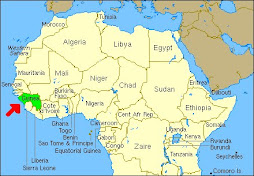On the morning of the
fête de Ramadan, the air was so cool that still lying in my bed, I had to clutch my sheet up around my neck.
It felt like Christmas morning, that latent anticipation for a big day you’re on the verge of beginning.
Last year the excitement was not knowing what to expect, in a new and foreign tradition.
This year, I was excited for the
fête itself that marks the end of Ramadan.
I couldn’t help but realize that I have no idea when, if ever again, I’ll be celebrating the
fête de Ramadan, an idea that gave me pause and made me appreciate the day that much more.
But I was pulled from my warm bed before 7am, as the first of my neighbors came by bearing
croquettes, and enthusiastic wishes of
Barka Desala!! Barka Desala!! Happy End of Ramadan!
I stood on my doorstep exuberantly shaking hands in my pajamas and poofy bed-hair.
The main event of the day is the gathering of all the faithful to pray. They assemble in droves in a huge field while nassaras and non-believers hang out and watch. I arrived early at the field, and perched myself on a rock under some trees, from which I watched the passers-by. Dark clouds were sweeping across Mokolo. Falling through the trees, small drops of rain slowly darkened my green pagne, and made me wonder why I’d bothered to slather myself in sunscreen. Floating in from somewhere far across the field, a hypnotic voice chanted Alllahhhhh al-ahkbarrrr, Alllahhhhh al ahkbarrrr, Godddd is greeeaaat, God is greeeaaat, soothingly and rhythmically.
Before the prayers, people roam the streets, greet friends, take pictures with the local nassaras… Thanks to Thea and Fleur, who took many of the pictures below! These are my neighbors: Garga, Issoufa, and some little piece of bubble gum I don’t know who jumped in the picture.

A Cameroonian boy band, or the inverse of a harem? You decide. I’d never even met them before!

No Ramadan fête is complete without a pair of designer sunglasses.

I think little guy on the right might be jealous of little boy on the left’s turban!

Hey Sisters, remember when Mom used to dress us up in those little matching red dresses?!

The prayers, solemn and timeless, mark the official end of a month of fasting during daylight hours. That fast includes not drinking any beverages, even water. I found my Muslim co-workers loved to ask me “How’s the fast going?” when I’d pull out my water bottle to take a few glugs in front of them. So finally, in attempted solidarity, I tried to fast a few times. On about the third day, I finally got it right (I still drink water though. I figure, Allah, Mohammed, and all those other guys can cut me a bit of slack as I’m new to all this.) This means you get up at about 4:30 to have breakfast before dawn. I got up and pulled out my cooking pans to heat up some leftovers. Through the dark, it was comforting to hear the clangs of my neighbors doing the same thing, as a reminder that I am not, in fact, crazy. Fleur however, smart girl that she is, had bouie (the typical breakfast beverage) in a thermos and a couple of beignets on her bedside table. At 4:30am, she sat up in bed, swallowed it down, and plopped back down to sleep. Why didn’t I think of that?! When I asked my counterpart Bouba about fasting, he told me that it’s done for three main reasons:
1) To feel hunger, and know what hunger feels like for those who are too poor to eat their fill.
2) It’s good for the body to fast, to clean it out from time to time.
3) To practice discipline and think of Allah.
And so, after a month of fasting, they gather to pray.

I always think of Easter dresses when I see the men’s beautiful flowing boubous! I wish American men could show up at Easter morning service in a boubou :)
This fête de Ramadan, however, reminded me, the non-believer, of Mardi Gras. (Is that irreverent?!) The excesses of food and the fasting, the parade of vehicles across town to visit the traditional chiefs, hoards of sociable people ambling in the streets.
Once the prayers were done the road through town was packed!

You can go on a truck,

On a moto, (there’s room for at least two more on there!)

Or if that’s how you like to roll, on a horse.

The excitement was palpable. A caravan formed to cross town, to visit a traditional chief. It must have included every van in Mokolo! Fleur, Thea and I ended up running across a field to try and catch up with it, chasing the cars as though running after floats in a parade, frantically looking for beads! (We just wanted pictures.) Here, instead of wearing tacky plastic beads you think are cool, you dress up in full pagne (I think it’s flattering, but I’ve been gone from the States for a while… you judge!) and you paint your hands funny colors!
The men are decked out in their best boubous, complete with the gondora, a huge sail of fabric they loop over their shoulders on top of the boubou. Thea and I found our friend Ibrahim. I was marveling at the sheer quantity of fabric that Ibrahim was wearing and I think our conversation went something like this:
Me: Hey Ibrahim, can I do bat wings with your boubou??!! Come onnnn, it’ll be fun!
Ibrahim: Hmmm, Not so sure about that, weird little American girl.
 Ibrahim
Ibrahim:
Alrighhhhht.
Me: See, this is so cool!! You look like a big blue bat!!
Ibrahim: Yeahhh, I am pretty cool.
 Me
Me: Told you!
Ibrahim: OK, give me back my boubou now, that’s enough. OK, give me back my boubou!!

Then we ran into Bouba, my counterpart at the MC2. He was a little more willing to indulge my Batman fetish.

In between terrorizing my friends in boubous, I’m fond of contemplating my hands. The henna is supposed to render them black, but I’m too impatient and didn’t want to walk around with henna and plastic bags on my hands for hours while it dried, so I came out with a semi-ridiculous carrot look. Woops :) What’s a couple months of orange fingers?!

We proceeded to shuffle all over town, eating loads and greeting people. Instead of the excesses of King Cake, I happily dined on endless croquettes, sweet fried dough balls that I like far too much. The visits are my favorite part of Ramadan, what I look forward to the most. I honestly can’t think of an American equivalent. If we attempted the same thing, would it just lead to traffic jams, and twitchy kids sitting in cars trying to behave? Here, we walk, eat, walk, eat, amble about some more. No one is really rushed, and it seems that somehow no one really has an agenda, but they always seem to know when to find their friends at home.
I stopped by my neighbor Aïssatou’s house. She’s my accomplice in the henna hands, which many of the neighborhood women did in preparation for the fête. Since Cameroonians refuse to smile for a posed photo, it was so hard to get this picture! I had to beg Aïssatou and her husband for one photo, American style, with a smile. At least the begging apparently amused them, which led to the desired result!

In an interesting turn of events, all the Protestants were likewise having a huge celebration, a joint service of all the different denominations at the local stadium marking the beginning of the school year. On top of that, the Catholic bishop was in town, performing Confirmations. Only the Atheists weren’t celebrating. (They/we just ran around crashing everybody else’s parties.) I couldn’t help but notice the stark contrasts between the faiths as Thea, Fleur, and I paused at the Protestant gathering. Whereas the Muslim prayers require strict male-female segregation, the Protestants mingled freely. The Muslim prayer was neat, orderly, efficient, with something reverent and sacred about it. The Christians sang and clapped in excitement, rambling on in informal and uncalculated prayers. Half-naked children romped through the Christian crowd. While the Muslims were dressed in their best pastel-colored boubous on men, and full pagne on women, the Christians were comfortably clad in t-shirts, pants, occasional sprinklings of pagne. The Muslim prayer reminded me of what old-school Catholicism must have resembled—steeped in unquestionable tradition and inaccessibility, yet beautiful, a bit magical, and surreal.
I think celebrating another’s most sacred holiday has helped me better appreciate the celebrations chez moi. It’s true I’ve remarked at times past that I’ve thought the U.S. has no culture—what do we do that’s original, or unique? When recently thinking about the importance of the fête de Ramadan here, I thought the best equivalent aux Etats-Unis is Christmas. And the first image of Christmas that popped into my mind was from a David Sedaris book I recently read, where he described working as one of “Santa’s elves” at Macy’s, shuffling children and families through the lines in “Santa-land,” that led to taking a photo on Santa’s knee, surrounded in décor of red and green pinwheels. And I think that my observation of times past is untrue. We do have a culture in the United States. Yes, it is largely influenced by consumerism and profit. At the fête de Ramadan, I’m sure those who sell flour and eggs make a buck off of all the croquettes I eat. But otherwise, the fête is based around people and traditions, and no commerce stands to win or lose. People may kill the goats they’ve raised in their yards but that doesn’t create a surge in commerce, or profits for anyone (particularly the goat!) So celebrations in America are more multi-layered and complex, colored with the distractions of consumerism. Yet I can still take back the appreciation for the layers I do like in American holidays—the camaraderie of my family, and creating the time and space to visit each other, even if we do it efficient-American style, all in one place. I am looking forward to celebrating holidays in the States in less than a year. :)
Alas, my fête de Ramadan finally ended as I headed to my house to rest and digest. Here’s a view of Mokolo late in the afternoon, in all its festive glory. (My house is in a neighborhood to the left side of the photo; the mountains are my view from the kitchen window.)

Overall, a satisfying
fête de Ramadan, just the way I like them. :)
Til, next time amigos, say your prayers, and until I’m back in the States to
fête with you personally, know that I am thinking of you!

















































